Exeter is Oxford’s fourth-oldest college. It has occupied much of its present site since 1315, a year after Exeter College was founded on 4 April 1314.
Its founder, Walter de Stapeldon, was a Devon man who rose from a humble background to become Bishop of Exeter and Treasurer of England under Edward II. He founded the College to provide an educated clergy for his diocese. During its first centuries, Exeter drew its members mainly from Devon and Cornwall.
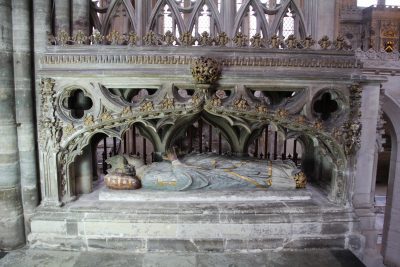
The founder of Exeter College, Walter de Stapeldon’s Tomb in Exeter Cathedral
The early College was a small and relatively poor foundation, consisting of a Rector, a Chaplain and 12 or 14 Fellows, all in holy orders. Probably from the late 15th century, the College offered rooms to a few students. All that remains of this medieval college is Palmer’s Tower, named after a 15th-century Rector.
In the next century the College’s fortunes were transformed. This was largely due to the generosity of Sir William Petre, a former undergraduate and, like Stapeldon, a Devonian and one of the leading statesmen of his time. Petre gave the College much new property, widened the area of its recruitment, and revised its constitution.
As a result, in the 17th century Exeter became one of the leading colleges in the University, with a high reputation as a school for academics and learned men. Numbers expanded. The present Hall was built in 1618, together with a matching chapel on the opposite side of the quad. The rest of the front quad was completed between 1672 and 1710.
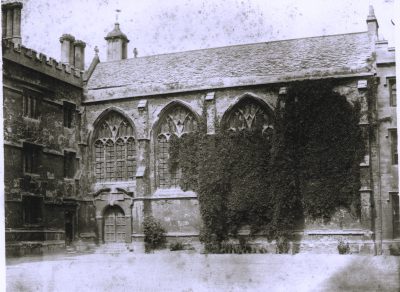
The old Exeter College Chapel
Like other colleges of the University, Exeter went through a decline in the 18th century. Happily this stagnation did not last. After the university reforms of the 1850s, the numbers of undergraduates rose sharply.
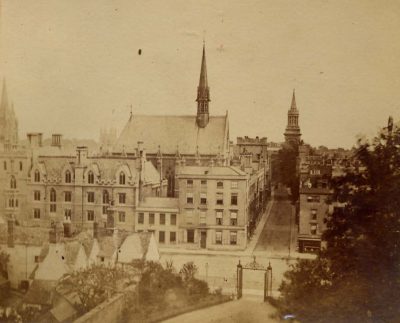
The ‘new’ Exeter College Chapel, seen from Trinity College, in the mid-Victorian Era
The Fellows of the College became a professional teaching body and undergraduate life took on its modern outlines. Team sports rose in popularity, the Junior Common Room was founded in 1887, and societies and discussion groups were numerous.
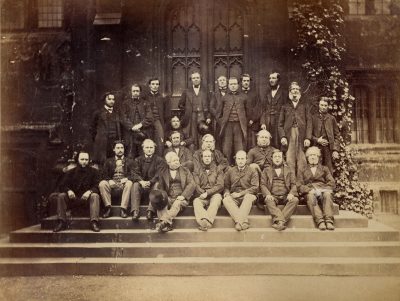
Exeter College staff (1864)
Victorian undergraduates who went on to achieve fame include Sir Charles Lyell, the pioneering geologist, J. A. Froude, the historian, and two of the leading pre-Raphaelites, William Morris and Edward Burne-Jones. Important works by Morris and Burne-Jones are on view in the Morris Room and Chapel.
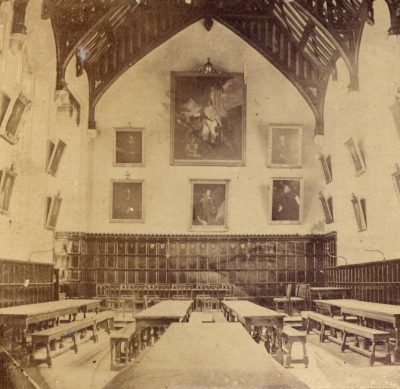
Exeter College Hall in 1860
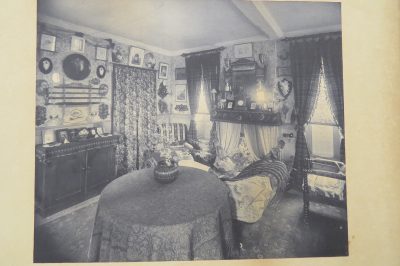
A student room in the 1880s
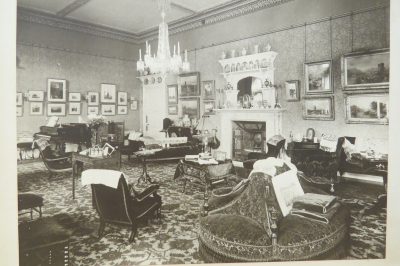
The Rector’s Drawing Room in the 1890s
In the 20th century the College expanded, like the rest of the University. New buildings sprung up to house more undergraduates in College, thanks to the generosity of alumni. In 1979 Exeter welcomed female students for the first time and in 1993 it appointed its first female Rector, Marilyn Butler, becoming the first formerly all-male college in Oxford to appoint a female head of house.
In 2017 Exeter College opened a site on Walton Street, Cohen Quad, which provides research and teaching space, an auditorium for concerts, dramatic performances and guest speakers, storage space for the College’s special collections plus a special collections reading room, a café, and accommodation for 90 students.
The Governing Body (the Rector and Fellows) has grown from about 12 just after the Second World War to around 55 in recent years. The main teaching Fellows represent all the main arts and science subjects.
Find out more
The College’s history from 1314 to 2014 is brought to life in a wonderful book, Exeter College: The First 700 Years. With historical insights, personal reminiscences and a large collection of photographs and illustrations, Exeter College: The First 700 Years reflects the college that so many alumni hold dear to this day. Purchase Exeter College: The First 700 Years.
A more scholarly review of the College’s early history, Founders and Fellowship: The Early History of Exeter College by John Maddicott, Emeritus Fellow in History at Exeter College, is also available to buy. Purchase Founders and Fellowship: The Early History of Exeter College.
Information about the Exeter College Legacies of Slavery Project can be found here.
